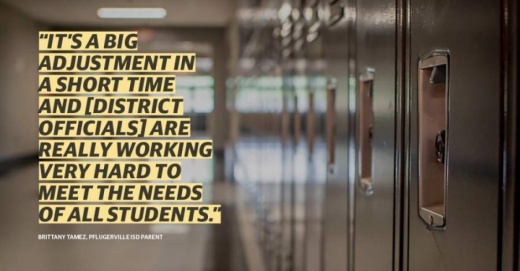But with school closures and e-learning well underway, Baudier’s work does not end when she clocks out in the evenings. An even bigger job—parenting—is still waiting for her.
“I am trying my best, but it is not doable,” Baudier said. “I mean, she's falling asleep at the tablet. And I can’t blame her, because it's 11:30. She's tired.”
Round Rock, Pflugerville and Hutto ISDs join the ranks of schools across the country that have had to adapt to an e-learning curriculum virtually overnight as the result of the coronavirus outbreak. Following Gov. Greg Abbott’s April 17 announcement that schools across Texas would remain closed for the duration of the 2019-20 academic year, parents are now on the front lines of their children’s education in unprecedented ways.
Area parents, who expressed different viewpoints on their children’s e-learning curriculum, agreed on one thing: Educators are doing the best they can at navigating uncharted territory.
Brittany Tamez is a PfISD parent with a daughter in pre-K. In response to a Community Impact Newspaper Nextdoor post, Tamez said the digital transition has been difficult but commended the work of PfISD officials in doing the best they can under unusual circumstances.
Tamez said she is a teacher in a neighboring school district, which has aided her in assisting with her daughter’s e-learning classes. But Tamez also said she can understand the challenges working parents face when balancing their jobs with their child’s education.
“I do appreciate the routine and the happiness the Zoom meetings bring my daughter,” Tamez said. “It’s a big adjustment in a short time and [district officials] are really working very hard to meet the needs of all students.”
Some local districts, such as PfISD, have utilized face-to-face class sessions through videoconferencing applications such as Zoom, as is the case with Tamez and her daughter. Others, including RRISD, have implemented asynchronous teaching, or lessons that are not done over videoconferencing at a set time.
RRISD Director of Special Education Marie Gonzales said in an April 15 email that at this time, all general and special education classes are using an asynchronous learning approach “to provide the greatest flexibility” to students and their families. Gonzales added with the physical and emotional stresses related to the coronavirus pandemic, asynchronous teaching can assist working parents or those with multiple children and accommodate their needs.
“Rather than structuring the learning so each child must access technology to participate in a class at a set, scheduled time, Round Rock ISD’s approach gives parents and students the flexibility to set the schedule that works best for their family’s needs,” Gonzales said.
Pflugerville resident Leesa Kriege said while the nature of the current situation is atypical, online learning is a resource more districts should consider pursuing in the future. Digital-based classes, Kriege said, can enhance students’ abilities to search for and hone in on coursework they are passionate about while still completing required courses.
“Students can learn at their own pace and not be held back by the limitations of others,” Kriege said. “This is the information era. Our schools need to get with the times, revamp their operations, evaluate and come together to create a better system which is more educational, diversified, productive, self-paced and focused to the students’ areas of interest which can also be realistically and financially sustained.”
With e-learning classes continuing for the remainder of the school year, district officials have said they will continually monitor feedback received from parents and students alike to determine any changes to the curriculum. For example, Gonzales said some changes have already been made to the type and amount of assignments administered to alleviate some of the workload off parents.
In an April 16 virtual talk, HISD Superintendent Celina Estrada Thomas said 93% of students have access to e-learning tools, and 78% have completed three of four core assignments as of April 10. Estrada Thomas commended the work of district teachers and personnel, who she said have continually worked with and advocated on behalf of their students.
“Those have been amazing numbers because our teachers have been outreaching and making sure that they know where all of their kiddos are," Estrada Thomas said.
Baudier said while improvements have been made to her daughter’s coursework, each day is still a learning process.
“When you have eight-plus hours of school every day and you can get it done, that's one thing. But unfortunately, some parents are still working,” Baudier said. “Hopefully it'll get better as we go.”





